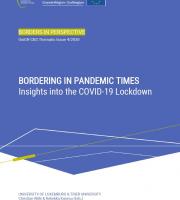
Au cours de la pandémie COVID-19, les frontières ont (re)pris de l'importance dans l'action politique et dans la vie quotidienne en très peu de temps. C'était particulièrement vrai pour les habitants des régions frontalières, dont le quotidien transfrontalier était soudainement irrité par la fermeture des frontières et les contrôles de police. Toutefois, la pandémie de COVID-19 a également entraîné une perception accrue des frontières sociales, culturelles, économiques, sanitaires et de mobilité au-delà des frontières nationales.
Les auteurs de la nouvelle édition de l’« UniGR-CBS Borders in Perspective » éclairent ces dynamiques sous l'angle des frontières territoriales, des démarcations sociales et des (dis)continuités dans les régions frontalières par le biais de diverses approches thématiques et spatiales. Leurs observations critiques et commentaires scientifiques ont été faits pendant le confinement en avril et mai 2020 et donnent un aperçu des événements pendant la pandémie mondiale.
Informations bibliographiques et télécharger:
Christian Wille et Rebekka Kanesu (éds.) (2020): Bordering in Pandemic Times. Insights into the COVID-19 Lockdown. Borders in Perspective, Vol. 4, UniGR-Center for Border Studies, télécharger
Contenu:
- Borders and COVID-19 (Christian Wille and Rebekka Kanesu)
- Border(ing)s in Times of COVID-19 (Christian Wille)
- Marché du travail transfrontalier : négocier avec les frontières à l’heure de la crise sanitaire COVID-19 (Isabelle Pigeron-Piroth, Estelle Evrard et Rachid Belkacem)
- Fermeture des frontières nationales : récits en territoire transfrontalier (Beate Caesar, Nicolas Dorkel, Sylvain Marbehant, Hélène Rouchet et Greta Szendrei)
- Das Coronavirus und die Erosion von Gewissheiten (Florian Weber)
- La frontière franco-allemande au temps du COVID-19 : la fin d’un espace commun ? (Frédérique Berrod, Birte Wassenberg et Morgane Chovet)
- What has happened to our cross-border regions? Corona, Unfamiliarity and transnational borderlander activism in the Danish-German border region (Martin Klatt)
- The closure of the border as a b-solution. Non-coordination of measures at the Dutch, Belgian and German border (Martin Unfried)
- Chronicles of the Living Borders: shared urban space of Goricia (IT) and Nova Gorica (SLO) (Svetlana Buko)
- COVID-19 in the borderland of San Diego and Tijuana: between re-bordering processes and contradictory realities (Albert Roßmeier)
- La frontière « nationale » brouillée par le COVID-19 (Grégory Hamez, Frédérique Morel-Doridat, Kheira Oudina, Marine Le Calvez, Mathias Boquet, Nicolas Dorkel, Nicolas Greiner et Sabrina de Pindray d’Ambelle)
- Corona – neue Herausforderungen und Perspektiven für Grenzraumpolitiken und grenzüberschreitende Governance (Nora Crossey)
- Einseitige Mehrsprachigkeit an der geschlossenen Grenze im Saar-Lor-Lux-Raum (Philipp Krämer)
- Linguistic rebordering: Constructing COVID-19 as an external threat (Eva Nossem)
- Reflections on a Boundless Critter in a Bordered World (Rebekka Kanesu)
- Those who are confined, are also the most mobile! (Anne-Laure Amilhat Szary)
- "What’s Home Gotta Do With It?" Reflections on Homing, Bordering, and Social Distancing in COVID-19 Times (Astrid M. Fellner)
- Geflüchtetenunterkünfte und Lager als Grenzparadigma: Lebenswirklichkeiten in Zeiten der Corona-Pandemie (Claudia Böhme und Anett Schmitz)
- Coronavirus, Social Boundaries and Food Security: Observations in Jamaica (Lisa Johnson)
Contact: Christian Wille, Université du Luxembourg, christian.wille@uni.lu; Rebekka Kanesu, Université de Trèves, kanesu@uni-trier.de


